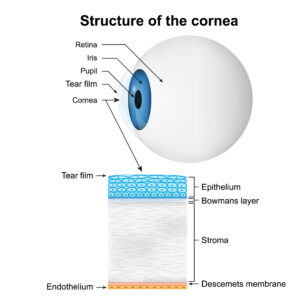Posted by: Clear Advantage in Featured, LASIK on December 2, 2022
Are you considering trading your glasses for lifelong visual freedom by getting LASIK? A laser vision correction procedure is a life-changing experience that can transform your daily life.
However, like every other procedure, it’s not a good fit for everyone. LASIK works by gently reshaping the cornea, the transparent outer part of your eye, with ultra-precise lasers.
Getting LASIK will permanently correct nearsightedness, farsightedness, and astigmatism. Be like the millions of happy patients around the globe who have had LASIK and love their results!
Debating if a vision correction procedure like LASIK is what you want? Keep reading for 7 signs that you are a good candidate for LASIK!
1. You Are at Least 18 Years Old

As incredible as LASIK is, you can’t undergo it if you’re under 18 years old. LASIK is only FDA-approved for those 18 years and older.
Why? Your eyes are still changing for some time, and getting LASIK while they continue developing won’t get you the results you want.
Some of the many changes during puberty include your eyes developing and stabilizing. If you get LASIK while they are still fluctuating, you won’t achieve the permanent results you want.
Getting LASIK when your eyes are not fully developed will make your procedure less effective. You would be able to see clearly for the time being.
However, when your prescription changes, you would need to return to wearing glasses or contacts or get a follow-up procedure. Because of this, the FDA requires that those wishing to undergo LASIK are at least 18 years old. At this point, you’ll be able to enjoy the best possible results meaning you’ll have clear vision that will last for years to come!
2. Your Prescription is Stable and Has Been for a Year or More

Do you constantly find that you need to get your prescription for your glasses or contact lenses updated? If this happens every time you see your eye doctor, you must wait to get LASIK.
Why? A stable prescription is a significant part of the success of a LASIK procedure. You may be 18 or older, but if your prescription continues fluctuating, you aren’t considered a good LASIK candidate yet.
Suitable LASIK candidates have stable vision that’s remained that way for a year or more. Some LASIK surgeons require your prescription to stay this way for a minimum of two years.
The good news? If your vision has yet to stabilize, it’s simply a waiting game. Once it does, there’s an excellent chance that you’ll be a good LASIK candidate and can undergo this life-changing procedure.
3. Your Prescription isn’t Too Strong

LASIK may seem like a miracle procedure, but it has its limits. One of these limits is making sure your prescription isn’t too strong.
LASIK treats nearsightedness, farsightedness, and astigmatism for most patients. But if your prescription falls outside the treatment limits and is too strong, you can’t have the procedure.
If your prescription is over these limits, it can be unsafe to have LASIK. Instead, you can consider alternative procedures like PRK or the EVO Visian ICL.
4. You’re Healthy

Suitable LASIK candidates need to be in good health. Now, there’s no reason to think you need to be in perfect health, but you need to be able to heal after any surgical procedure, including LASIK.
If you have certain autoimmune conditions like diabetes, lupus, or Sjogren’s syndrome, you may not be a good LASIK candidate. Besides needing to be healthy, the same is true of your eyes.
Having healthy eyes is also necessary. You cannot have any preexisting eye conditions like dry eye syndrome or glaucoma. For dry eyes, if you can get the condition under control, you may be able to undergo LASIK at a later time.
5. You Have Thick Enough Cornas

One LASIK candidacy factor you can’t measure on your own is the thickness of your corneas. However, it’s one of the essential factors!
Getting LASIK requires reshaping your cornea by creating a flap and removing a tiny amount of corneal tissue to correct refractive errors. If your corneas are too thin, removing even a small portion of tissue can result in vision problems and severe complications.
You’ll have the thickness of your corneas measured and evaluated by your eye doctor during your LASIK consultation. If your corneas are the right thickness, this will help increase your chances of being a LASIK candidate.
If your corneas are too thin, your eye doctor may recommend another procedure to help you achieve your goals of visual freedom.
6. You’re Not Pregnant or Nursing

Believe it or not, pregnancy can affect your vision. Many pregnant or breastfeeding women notice that their glasses or contacts are no longer as effective as they were before.
Fluctuating hormone levels can cause your prescription to change. Because a stable prescription is needed to ensure the best results, you should wait until you are no longer pregnant or nursing to get LASIK. Consider waiting until you know you will no longer be having any more children for the best possible results.
7. You Have Realistic Expectations for Your Results

LASIK can be life-changing. Your outcome will depend on a range of factors, though.
The outcome and results you end up with depend on the patient and will vary. Laser vision correction procedures have a very high patient satisfaction rate.
The vast majority of patients are happy with their results. You should have realistic expectations about what LASIK can achieve to support your ideal outcome. Most people can reduce their dependence on glasses and contacts, but total freedom from visual aids is not guaranteed.
Are you ready to take a big step toward your best vision yet? Schedule an appointment at Clear Advantage Vision Correction in Portsmouth, NH, to find out if you are a good candidate for LASIK!






